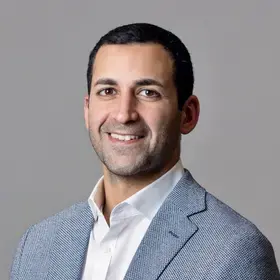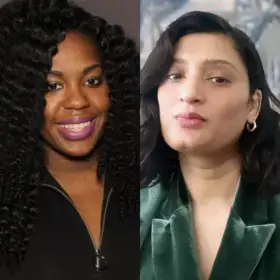One year after graduating, Julienne Hadley is on an upward trajectory in her career.
She has been recruited twice for positions at Yale University's Information Technology Services (ITS), leading to her current work as Associate Director, Strategic Communications and Organizational Change Management. She credits her experience learning in the School of Professional Studies' M.S. in Strategic Communications (now known as the Executive M.S. in Strategic Communication) in helping her “climb the ladder,” and we talked to her by email to get the scoop.
Tell me about your career, and how you decided to study for your master's.
My undergraduate degree from the University of Connecticut was a hybrid of art history, communications, and business, so I’ve always had an interest in Communications. Years later, I joined the communications and marketing team at the Yale Center for British Art and realized that I could benefit from gaining a deeper understanding of communication strategy. It also became clear that I wouldn’t be able to advance my career (especially while working in higher education) without a Master’s degree.
I started looking for a graduate program that would prepare me for future leadership roles in communications. At first, I was looking at schools in Connecticut, for ease of commuting, because I was committed to working full time while going back to school. However, it soon became clear to me that none of the programs were the right fit: they were too theoretical, too media-focused, too remote, or too junior (I was 33 when I decided to apply and wanted to be surrounded by seasoned professionals).
When I learned about the program at Columbia, it just felt like the right fit: coursework was challenging, classmates were experienced professionals, teachers were practitioners, and learning objectives were practical. [The School of Professional Studies at] Columbia was the only school I wanted to attend and it was the only school for which I submitted an application.
What was your focus in the program?
Gaining the confidence to help my employers solve their business problems was my primary focus, rather than memorizing certain terms, approaches, or theories. I can say with confidence that I do feel like I’ve achieved this goal and I’m regularly asked to participate in committees or lead initiatives to contribute my strategic communications perspective.
While in the program, I found the “Content Strategy” course to be particularly interesting and relevant to my day-to-day needs when thinking about strategy, particularly as it applies to web content, social media, and messaging, and I have since given a talk on the subject at Yale.
How did your experience getting your M.S. shape your focus and interests in your career?
Getting my M.S. really opened doors for me. Before I even received my degree, I was recruited for a higher level and higher paying position, and only one year after that I was recruited for an Associate Director position. I also believe that having a degree from an Ivy League school put me at an advantage, particularly while working for a fellow Ivy, Yale University.
Did any teachers and classes specifically influence you?
I enjoyed learning from the professors who taught “Setting the Strategic Direction” and “Creative Expression and Channel Architecture,” while working on our capstone project — a team project on behalf of WNYC, New York Public Radio. I found it especially helpful to learn about developing a communications campaign while working for real clients over the course of a year. Not only was it an amazing experience, it was an excellent resume builder. Putting those skills to use gave me practical tools and knowledge that I’m still using today in my job.
You've worked in communications at Yale. How did your master's degree lead to your new job?
I was recruited from within Yale ITS for my current position, where I work as the Associate Director, Strategic Communications and Organizational Change Management.
About six months after starting my former position at Yale ITS, I asked for an informational interview with the current Associate Director of Strategic Communications, to get a better sense for what a "Strategic Communicator” was doing in the field. I shared a few approaches for her to consider while working on current projects and she encouraged her boss, the Director of Communications and Organizational Development, to meet with me. Shortly thereafter, when changes were being made to the organizational structure, I was encouraged to apply for the position I currently have. Throughout this process, it was clear to me that my background in strategic communications was highly desirable, and a big part of why I was able to secure the job.


